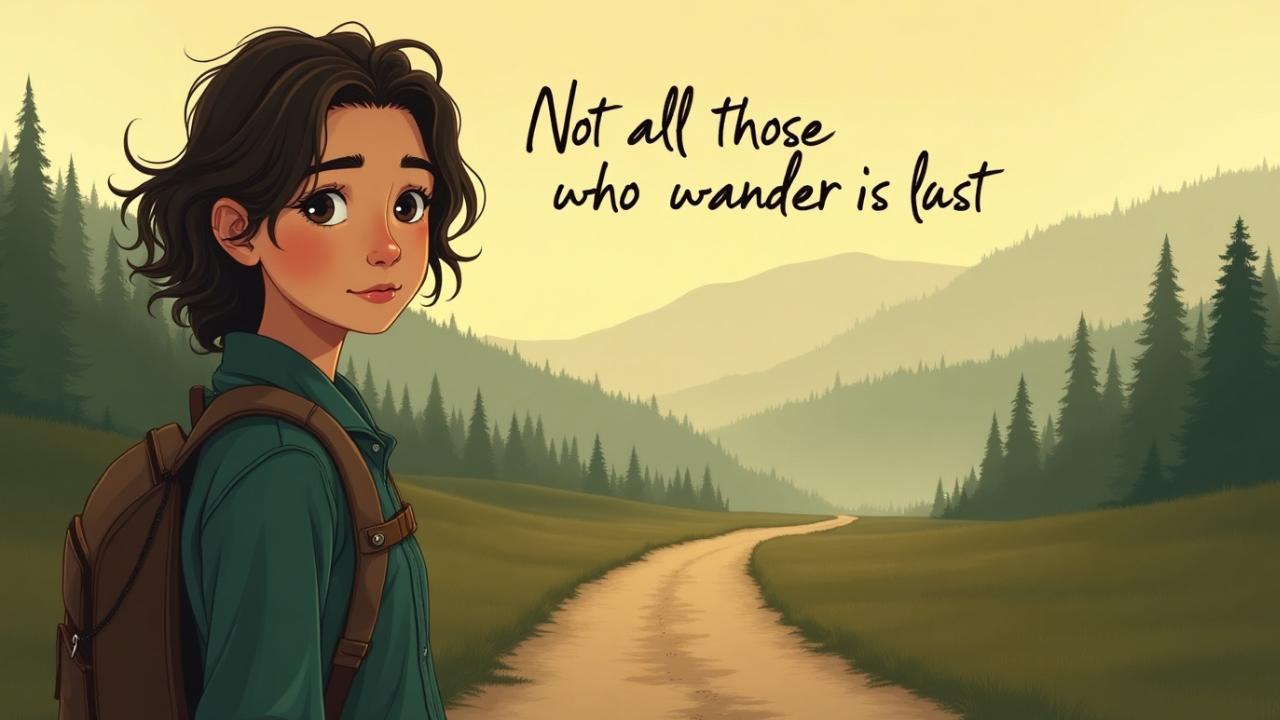“Not all those who wander are lost.” This powerful line from J.R.R. Tolkien’s poem in The Lord of the Rings has resonated with travelers, dreamers, and free spirits worldwide. It suggests that wandering doesn’t always mean aimlessness—sometimes, it’s about discovery, adventure, and personal growth.
In a world that values structure and stability, those who choose to explore new places, cultures, and experiences are often misunderstood. But in reality, travel opens the mind, broadens perspectives, and leads to incredible personal development. Whether you’re trekking through remote landscapes or simply embracing a nomadic lifestyle, wandering can be a purposeful and enriching experience.
In this article, we’ll dive into the deeper meaning of this quote, how it applies to travel and adventure, and why wandering is an essential part of life.
The Deeper Meaning Behind “Not All Those Who Wander Are Lost”
J.R.R. Tolkien originally wrote this quote as part of a poem describing Aragorn, a wandering but purposeful character in The Lord of the Rings. Though Aragorn roamed far and wide, he had a strong purpose guiding him.
This idea applies to real life as well—wandering isn’t always about being lost. It can mean searching for something greater, learning, and growing along the way. Many travelers set out without a rigid plan but end up finding themselves in the process.
- Self-discovery through exploration – When we leave behind routine and step into the unknown, we often learn more about ourselves than we ever could at home.
- Gaining new perspectives – Travel allows us to see the world from different viewpoints, breaking away from our preconceived notions.
- Finding purpose in movement – Some people feel most alive when they’re on the move, seeking experiences rather than material things.
Why Traveling Is More Than Just Moving From One Place to Another
Travel isn’t just about getting from point A to point B. It’s about the experiences, lessons, and transformations that happen along the way.
1. Travel Leads to Personal Growth
- Meeting new people and adapting to different cultures fosters personal development.
- Facing unexpected challenges (missed flights, language barriers) builds resilience.
- Stepping out of one’s comfort zone leads to newfound confidence.
2. Travel Expands Perspectives
- Seeing how others live challenges our assumptions.
- Experiencing new traditions broadens our cultural understanding.
- Witnessing different lifestyles teaches gratitude and humility.
3. The Joy of the Unknown
- The thrill of exploring places you’ve never seen before is unparalleled.
- Unexpected encounters and surprises make the journey even more rewarding.
- Every destination has a unique story to tell, waiting to be discovered.
For many, travel isn’t just a luxury—it’s a way of life.
Solo Travel: A Journey to Self-Discovery
Traveling alone might seem intimidating at first, but it’s one of the most rewarding experiences you can have.
1. Benefits of Solo Travel
- Complete freedom – No need to compromise on where to go or what to do.
- Personal growth – Stepping out alone builds self-confidence.
- Deep self-reflection – Without distractions, you learn more about yourself.
2. Overcoming Fears and Challenges
- Facing language barriers, navigation struggles, and cultural differences strengthens problem-solving skills.
- Solo travelers often become more adaptable and independent.
3. Stories of Famous Solo Travelers
- Many adventurers, from explorers like Ibn Battuta to modern-day travel influencers, have wandered the world alone and thrived.
Whether you’re backpacking through Europe or exploring hidden gems in your own country, solo travel is an incredible way to grow.
Adventure Travel: Breaking Free From Comfort Zones
If you crave excitement, adventure travel might be your perfect escape. It’s about pushing limits and experiencing the world in thrilling ways.
1. Why Adventure Travel is Gaining Popularity
- More people seek experiences over material possessions.
- Social media has inspired adventurous lifestyles.
- Adventure travel helps disconnect from the digital world and reconnect with nature.
2. Examples of Thrilling Adventures
- Hiking – Trekking in the Himalayas, Patagonia, or the Grand Canyon.
- Scuba Diving – Exploring marine life in the Great Barrier Reef.
- Skydiving – Freefalling over stunning landscapes.
3. Mental and Physical Benefits of Adventure Travel
- Overcoming fears builds resilience.
- Outdoor activities improve physical fitness.
- Pushing limits boosts confidence.
Adventure travel isn’t just about thrill-seeking—it’s about experiencing life to the fullest.






